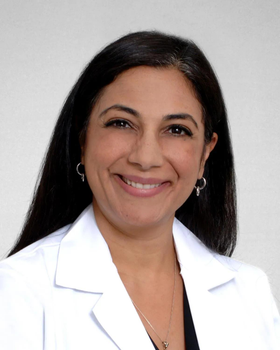Diverticular Disease Overview
Learn About Diverticular Disease
Diverticula are small, bulging sacs or pouches that form on the inner wall of the intestine. Diverticulitis occurs when these pouches become inflamed or infected. Most often, these pouches are in the lower part of the large intestine (colon).
The formation of pouches or sacs on the intestinal lining is called diverticulosis. It is found in more than half of Americans over age 60. However, no one knows exactly what causes the pouches to form.
Eating a low-fiber diet mostly made up of processed foods may be a cause. Constipation and hard stools are more likely when you do not eat enough fiber. Straining to pass stools increases the pressure in the colon or intestines, which may lead to the formation of these pouches.
In some cases, one of the pouches can become inflamed and a small tear develops in the lining of the intestine. This can lead to an infection at the site. When this occurs, the condition is called diverticulitis. The cause of diverticulitis is not known.
People with diverticulosis often have no symptoms, but they may have bloating and cramping in the lower part of the belly. Rarely, they may notice blood in their stool or on toilet paper.
Symptoms of diverticulitis are more severe and often start suddenly, but they may become worse over a few days. They include:
- Pain or discomfort, usually in the left lower part of the abdomen
- Bloating or gas
- Fever and chills
- Nausea and vomiting
- Not feeling hungry and not eating
The treatment of diverticulitis depends on how serious the symptoms are. Some people may need to be in the hospital, but often, the problem can be treated at home.
To help with the pain, your provider may suggest that you:
- Rest in bed and use a heating pad on your belly.
- Take pain medicines (ask your provider which ones you should use).
- Drink only fluids for a day or two, and then slowly begin drinking thicker liquids and then eating foods.
The provider may treat you with antibiotics.
After you are better, your provider may suggest that you add more fiber to your diet. Eating more fiber can help prevent future attacks. If you have bloating or gas, reduce the amount of fiber you eat for a few days.
Once these pouches have formed, you will have them for life. Diverticulitis can return, but some providers think a high-fiber diet may lessen your chances of a recurrence.
Egil And Pauline Braathen Center/Maroone Cancer Center
Marylise Boutros is a Colorectal Surgeon in Weston, Florida. Dr. Boutros is rated as an Elite provider by MediFind in the treatment of Diverticular Disease. Her top areas of expertise are Diverticular Disease, Colorectal Cancer, Viral Gastroenteritis, Ileostomy, and Colostomy.
Antonio Tursi practices in Rome, Italy. Mr. Tursi is rated as an Elite expert by MediFind in the treatment of Diverticular Disease. His top areas of expertise are Diverticular Disease, Viral Gastroenteritis, Colitis, Colonoscopy, and Endoscopy.
University Of Wisconsin Medical Foundation Inc
Lisa Strate is a Gastroenterologist in Madison, Wisconsin. Dr. Strate is rated as an Elite provider by MediFind in the treatment of Diverticular Disease. Her top areas of expertise are Diverticular Disease, Gastrointestinal Bleeding, Viral Gastroenteritis, Colonoscopy, and Endoscopy. Dr. Strate is currently accepting new patients.
Most often, this is a mild condition that responds well to treatment. Some people will have more than one attack of diverticulitis. Surgery may be needed in some cases. Many times, providers will recommend that you have a colonoscopy after diverticulitis has healed. This can help to rule out other conditions that could mimic diverticulitis symptoms.
More serious problems that may develop are:
- Abnormal connections that form between parts of the colon or between the colon and another part of the body (fistula)
- Hole or tear in the colon (perforation)
- Narrowed area in the colon (stricture)
- Pocket filled with pus or infection (abscess)
- Bleeding from the diverticula
Contact your provider if symptoms of diverticulitis occur.
Also call if you have diverticulitis and you have:
- Blood in your stools
- Fever above 100.4°F (38°C) that does not go away
- Nausea, vomiting, or chills
- Sudden belly or back pain that gets worse or is very severe
Summary: This is a single-center, open-label study for safety and feasibility of IMT in patients undergoing colonic surgery. After consent, individuals of the ages of 18-75 with a history of diverticulitis or sigmoid colon cancer will be enrolled to have a feeding tube placed at the time of surgery and receive IMT solution on postoperative day 2-3 (at least 48 hours following IV antibiotics) with the subse...
Summary: This study is designed to be a multicentre, prospective, comparative, randomised trial, evaluating the efficacy of two surgical strategies for the treatment of generalised peritonitis due to perforated diverticulitis. Results will be analysed according to an intention to treat principle (after selection and patient consent). Immediately before surgery, the patient will be randomly assigned to sigm...
Published Date: May 14, 2024
Published By: Jenifer K. Lehrer, MD, Department of Gastroenterology, Aria - Jefferson Health Torresdale, Jefferson Digestive Diseases Network, Philadelphia, PA. Review provided by VeriMed Healthcare Network. Also reviewed by David C. Dugdale, MD, Medical Director, Brenda Conaway, Editorial Director, and the A.D.A.M. Editorial team.
Bhuket TP, Stollman NH. Diverticular disease of the colon. In: Feldman M, Friedman LS, Brandt LJ, eds. Sleisenger and Fordtran's Gastrointestinal and Liver Disease. 11th ed. Philadelphia, PA: Elsevier; 2021:chap 121.
Kuemmerle JF. Inflammatory and anatomic diseases of the intestine, peritoneum, mesentery, and omentum. In: Goldman L, Cooney KA, eds. Goldman-Cecil Medicine. 27th ed. Philadelphia, PA: Elsevier; 2024:chap 128.
